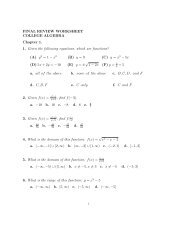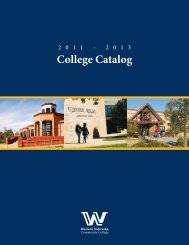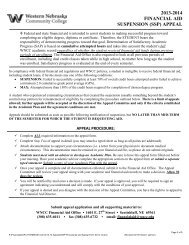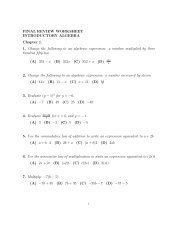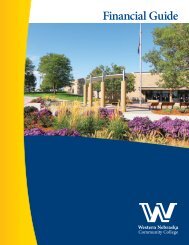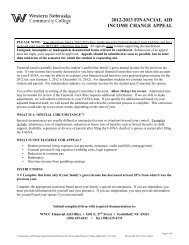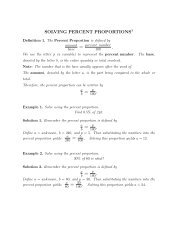WNCC 2010 Self-Study Report - Western Nebraska Community ...
WNCC 2010 Self-Study Report - Western Nebraska Community ...
WNCC 2010 Self-Study Report - Western Nebraska Community ...
You also want an ePaper? Increase the reach of your titles
YUMPU automatically turns print PDFs into web optimized ePapers that Google loves.
insubordination of a staff member, nor will it prevent the institution from evaluating the<br />
work and effectiveness of each and every professional staff member, nor will it constitute<br />
an excuse for non-compliance with the institution’s policies and procedure or for a<br />
disregard for its welfare (RR 110).<br />
Adherence to the Code of Ethics, copyright laws, and guidelines for academic freedom help to<br />
ensure that both faculty and staff operate in an ethical, moral, and responsible manner.<br />
Academic Integrity Statements and the Student Code of Conduct<br />
Not only does <strong>WNCC</strong> support faculty and staff members in the responsible acquisition and<br />
application of knowledge, but the College supports students through academic integrity statements,<br />
guidance for the proper use of technology, the Student Code of Conduct in the College Catalog,<br />
and many different student organizations and resources (RR 111).<br />
The <strong>WNCC</strong> Catalog and the Student Planner contain statements that encourage students to be<br />
responsible, law-abiding citizens; the sections also define and warn against academic misconduct,<br />
including plagiarism and other forms of cheating. An Academic Integrity Statement is a required<br />
element of a <strong>WNCC</strong> syllabus, assuring that students are aware of plagiarism and of the College’s<br />
policy regarding academic integrity, as shown by the example of the recommended syllabus<br />
statement presented below:<br />
ACADEMIC INTEGRITY:<br />
Academic integrity forms a fundamental bond of trust between colleagues, peers,<br />
teachers, and students, and it underlies all genuine learning. At <strong>WNCC</strong>, there is no<br />
tolerance for plagiarism or academic dishonesty in any form, including unacknowledged<br />
"borrowing" of proprietary material, copying answers or papers, using crib sheets,<br />
unauthorized help during exams, altering tests, or passing off someone else's work as<br />
one's own.<br />
A breach of ethics or act of dishonesty can result in:<br />
• failure of a paper or an exam within a course<br />
• failure of an entire course (blatant plagiarism or cheating on a test or quiz)<br />
• academic suspension or expulsion from the College<br />
Honor Code<br />
A <strong>WNCC</strong> Pledge of Honor was developed in early 2007 for students and faculty members in<br />
developmental-level courses. The purpose of the statement, which is designed to provide<br />
information and then allow for student and faculty member endorsement by signatures, is defined<br />
as follows in this statement from the introduction of the document:<br />
Members of the <strong>Western</strong> <strong>Nebraska</strong> <strong>Community</strong> College governing board, administration,<br />
faculty, and staff believe that a fundamental objective of the college experience is to<br />
provide students with a high quality education while also developing in them a sense of<br />
ethics and social responsibility. We believe that earned trust is an integral part of the<br />
learning process and that self-discipline is necessary in this pursuit. We also believe that<br />
an instance of dishonesty harms the entire college community. It is with this in mind that<br />
we set forth an Honor Code at <strong>WNCC</strong> (RR 112).<br />
Page 150<br />
<strong>Western</strong> <strong>Nebraska</strong> <strong>Community</strong> College



